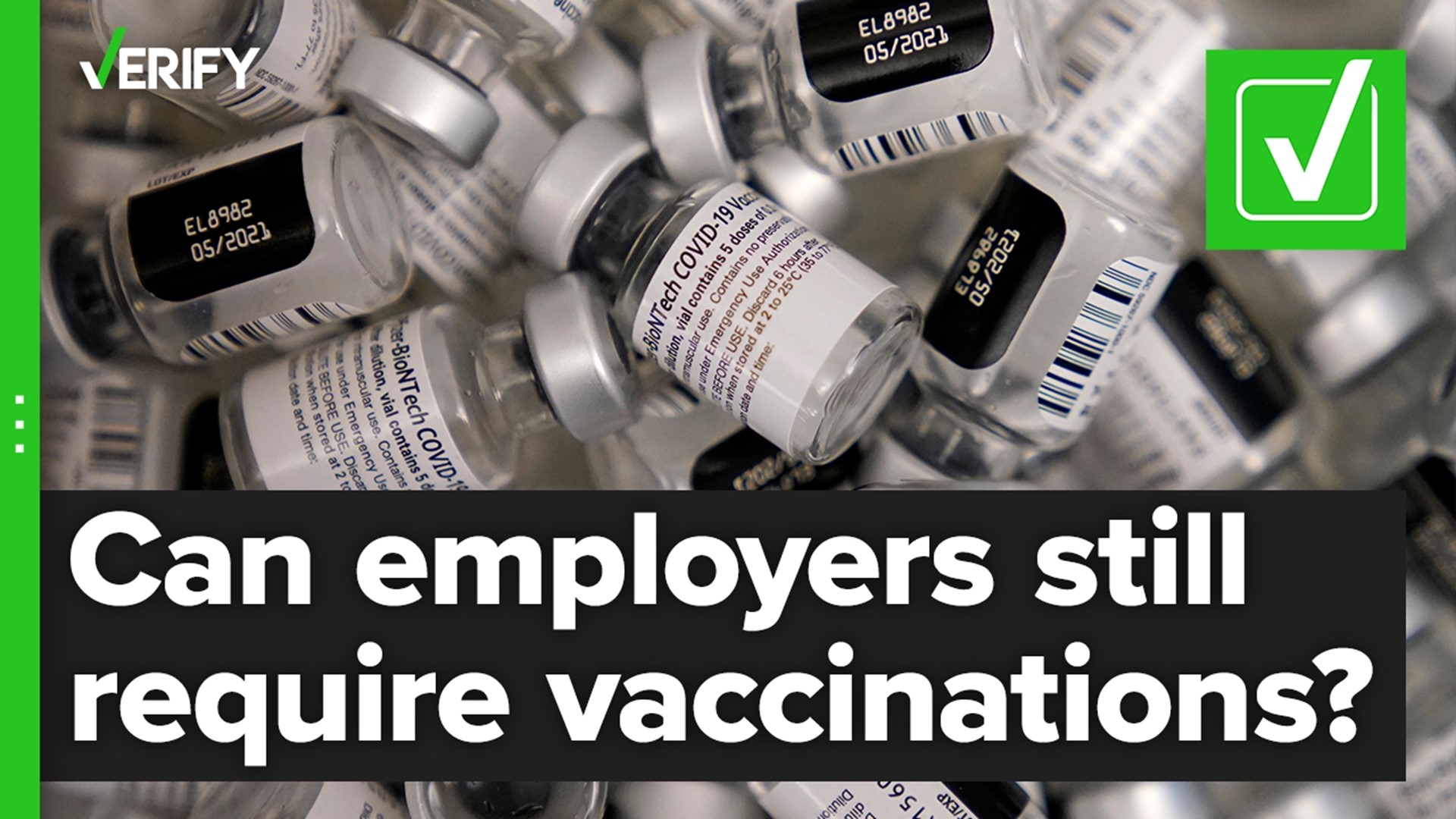On Thursday, the Supreme Court blocked a federal vaccine mandate that required employees at companies with 100 or more workers to get vaccinated against COVID-19 or undergo weekly testing.
The Occupational Safety and Health Administration (OSHA), a regulatory arm of the Department of Labor, issued the vaccinate-or-test mandate as an emergency temporary standard in November 2021. This gave President Joe Biden’s administration the authority to enforce the requirement for large employers.
In an opinion on National Federation of Independent Businesses v. OSHA, the Supreme Court’s conservative majority wrote that the OSHA mandate overstepped its legal authority and is “otherwise unlawful.” That means the Biden administration can no longer enforce the vaccine mandate for employers with 100 or more workers.
After the ruling, many people on social media questioned whether employers could still mandate vaccines or COVID-19 tests.
THE QUESTION
Can employers still require employees to get vaccinated or tested for COVID-19 after the Supreme Court ruling?
THE SOURCES
- Opinions from the Supreme Court of the United States on National Federation of Independent Businesses v. OSHA and Biden v. Missouri
- Biden administration
- Equal Employment Opportunity Commission
- The Occupational Safety and Health Administration (OSHA), a regulatory arm of the Department of Labor
- US Department of Health and Human Services Secretary Xavier Becerra
- Florida Attorney General Ashley Moody’s office
THE ANSWER
Yes, employers can still require employees to get vaccinated or tested for COVID-19 after the Supreme Court’s ruling.
WHAT WE FOUND
The Supreme Court blocked President Joe Biden’s administration from enforcing the vaccinate-or-test mandate with a ruling on Jan. 13. While the federal government can no longer require employees at large companies with 100 or more workers to get vaccinated or undergo weekly testing, states and private businesses can still impose their own mandates as long as state laws do not prevent them from doing so.
Biden released a statement expressing disappointment in the ruling, claiming his administration had the right to impose such a mandate. He said the ruling meant his administration “cannot use the authority granted to it by Congress” to require employees at large companies to get vaccinated or be tested for COVID-19. However, he emphasized that states and individual employers can implement such requirements.
“As a result of the Court’s decision, it is now up to States and individual employers to determine whether to make their workplaces as safe as possible for employees, and whether their businesses will be safe for consumers during this pandemic by requiring employees to take the simple and effective step of getting vaccinated,” Biden’s statement said.
Following the Supreme Court’s decision, U.S. Department of Health and Human Services Secretary Xavier Becerra affirmed that employers can still require COVID-19 vaccines.
“Right now, all across the country, many businesses and institutions have already begun implementing vaccine requirements, and as the President has urged, I encourage even more to do so,” Becerra wrote.
According to the Equal Employment Opportunity Commission, federal equal employment opportunity (EEO) laws do not prevent an employer from requiring all employees physically entering the workplace to be vaccinated for COVID-19 as long as it isn’t discriminatory against specific groups of people.
In its guidance on mitigating and preventing the spread of COVID-19 in the workplace, OSHA says it “suggests that employers consider adopting policies that require workers to get vaccinated or undergo regular COVID-19 testing – in addition to mask wearing and physical distancing – if they remain unvaccinated.”
States can pass their own laws regulating vaccine mandates for employers, and some already have. For example, Florida businesses can only mandate vaccines for employees based in the state if they also allow exemptions for religious reasons or exempt employees who agree to be tested and wear personal protective equipment (PPE) – such as a mask – and agree to cover the cost of PPE, according to State Attorney General Ashley Moody’s website.
Despite the Supreme Court’s decision to block the federal vaccine requirement for large employers, it is allowing a vaccine mandate for health care workers at federally funded facilities nationwide to take effect.
The Secretary of Health and Human Services announced in November 2021 that participating facilities must ensure their staff who are not exempt for medical or religious reasons are vaccinated against COVID-19 in order to receive Medicare and Medicaid funding. In an opinion on Biden V. Missouri, the court agreed to a request from the Department of Health and Human Services that medical facilities implement a mandate in order to receive government funding for Medicaid and Medicare.
This means the requirement will not change for workers in many hospitals, doctor's offices or other medical settings.

